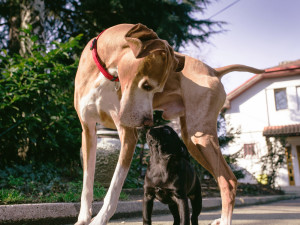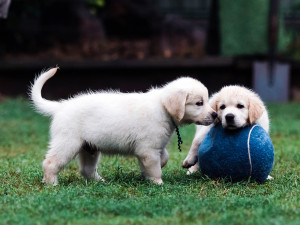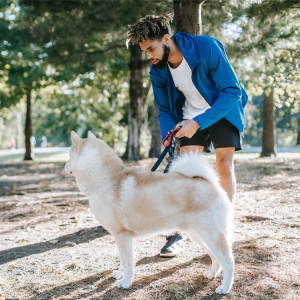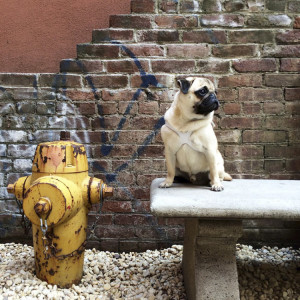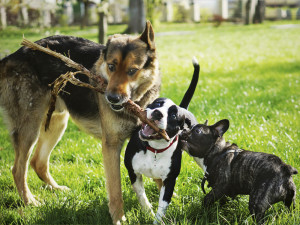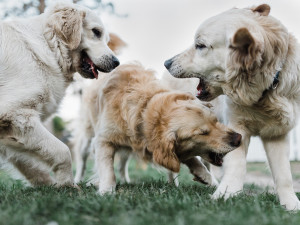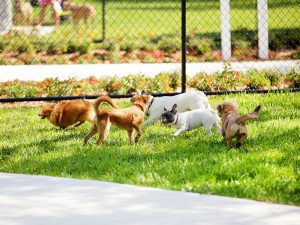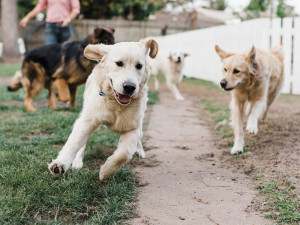How to Deal With All the Drama at the Dog Park
In the end, some jerks are just better to avoid. But it’s worth trying to resolve things first.
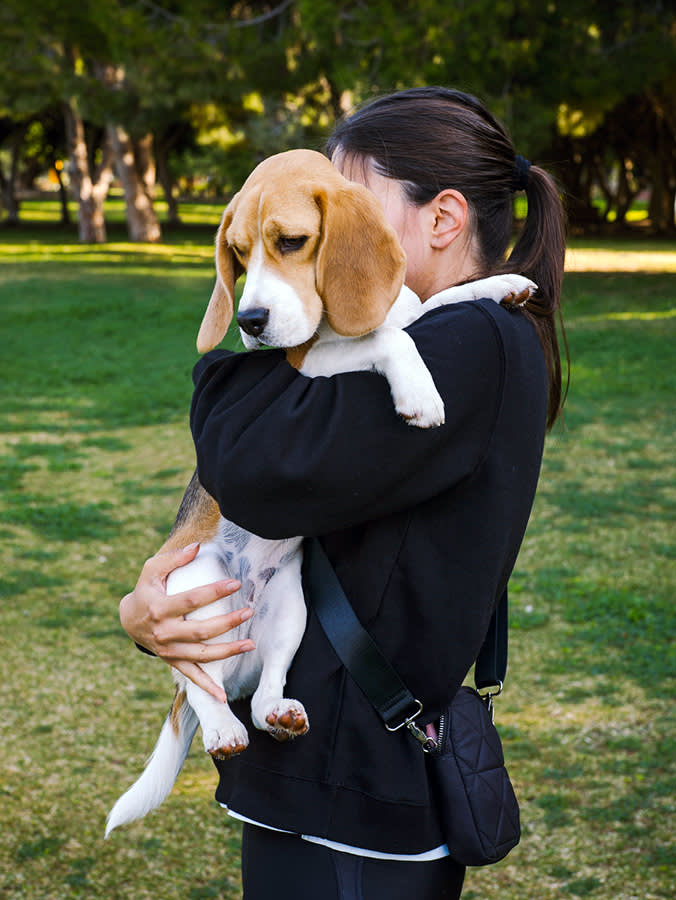
Share Article
There’s nothing dog parents bond over more than being dog parents. The first time you arrange a one-on-one pup playdate with someone you meet at the dog park? Magic. And yet, when it comes to people and their dogs, emotions often run high. But the second there’s a squabble between dogs, or a fellow dog parent doesn’t like how something’s been handled, things can turn sour.
Even something as minor as telling someone you think their dog is playing too rough can cause them to get defensive and lash out. “Criticizing someone’s dog’s behavior is as risky as criticizing a child’s behavior to their parent,” says Kimberly Bestopens in new tab, dispute resolution expert and founder of Best Conflict Solutionsopens in new tab. “People have a lot of emotional investment in their perception of their dog and their dog parenting.”
So, how should you address issues with other dog parents at the park? The first thing you have to do is build a rapport with the person whose behavior or whose dog’s behavior you would like to see change. “Think of relationships with people as investments,” Best says. “We are like banks: In order to make a withdrawal — in the form of feedback or criticism — we first need to make some deposits by building connection and trust. It will almost never work to walk up to a stranger and criticize them.”
Start with a baseline relationship before you address conflict.
Of course, building a rapport with someone can be tough, especially in the aftermath of an incident involving your dog, when all you want to do is say your piece, but it is essential if you want to create lasting change.

Once you establish a rapport with another dog parent — which could take minutes or months, depending on the people involved — Best suggests you ask the person if they are receptive to feedback. If they say yes, “make sure to let them know that the issue is something that you are experiencing as a problem, and you need their help to try to understand it and resolve it,” Best says. “Language that is blaming or finger-pointing is guaranteed to earn a defensive response, so make sure you maintain a calm demeanor and don’t escalate the problem with your tone, body language, or word choice.”
Best adds that it’s also important not to expect a particular response from that person but to just communicate the best you can and hope they respond in turn: “We may not get the response we wanted at that time, but a seed has been planted, and people almost always consider what they heard later, after their initial emotional reaction wears off.”
Figure out what the problem is (and whose it is).
It’s also important to consider whether the problem really is theirs or yours. In her bookopens in new tab The Dance of Anger, author and clinical psychologist Dr. Harriet Lerner says the person with the problem is the one responsible for solving that problem.
You can’t just go up to someone with a list of grievances and expect them to see things your way and then change to suit you. Even if you think you’re in the right. Even if most people would agree with you. Even if the person in question is breaking some written or unwritten dog park rule, like not picking up their dog’s poop or letting their dog go on an unchecked humping spree.
If you want change, it’s much easier to change yourself than someone else. If you don’t want your dog to get humped, remove them. If you don’t like seeing dog poop in the dog run, offer a bag to the dog’s parent, and if they decline, go pick it up yourself. Or let it go. Often these are your only realistic options if you want to avoid a conflict. Especially in the minimally-regulated space that is the dog park, where rules may lack legal enforceability.
“Rules posted at public dog parks are typically guidelines rather than legally enforceable regulations,” says Frank Leytonopens in new tab, a California-based personal injury lawyer specializing in dog attacks. “Local ordinances may support these rules and failure to comply could result in fines or other penalties,” Leyton says. But unless the violation is witnessed by someone with the authority to address these issues directly and dole out punishments, it is going to fall to you to gather evidence, take statements, file a report, and follow up until the issue is resolved.
The situation is similar in private dog parks, like those in gated communities. “The rules are often enforceable under the community’s regulations,” Leyton says. “[And] violation of these rules can result in penalties outlined in the community’s bylaws, which may include fines or even barring access to the park.” But, again, achieving this result will probably require work on your part.
If that’s work you want to do, by all means, proceed. But your end goal might be better and more efficiently achieved by getting to know the other person and taking it from there. In that case, “keep in mind that in a park-like setting, being scrutinized in front of others could be embarrassing,” says etiquette expert Lisa Miraz Groatsopens in new tab. If you want the person to be receptive to your concerns, it is probably best to deliver them in private, assuming you feel safe doing so.
Handle fallout from the conflict with grace.
Of course, even if you do everything “right” the other person could still get offended and lash out. In that case, Best recommends you apologize. “Say, ‘I’m sorry to offend you’ and acknowledge that the feedback is hard to hear and that hearing it would be difficult for you too,” Groats says. “Let them know that your intent wasn’t to cause a problem.”
And if they are still angry, walk away. Your safety and the safety of your dog are what matters. This can be a hard pill to swallow, especially if the issue you are bringing up is one of safety — if you feel like you, your dog, or others in the park are at risk. For instance, this could be an issue of a dog who is hurting other dogs at the park. In that case, the most expeditious and realistic action you can take is probably to remove your dog from the situation. Perhaps permanently.
Yes, you may need to give up on this park, even if this is the only time of day that you can come. Even if it’s the closest park to your house. Even if you like talking to all the other dog parents that go at that time, and your dog is always so excited to see their dog friends. You have to prioritize what is best for your dog over preferences and convenience.
Who’s responsible if a dog gets attacked?
That said, it’s certainly not your fault if a dog belonging to a person you don’t know shows up at the park and attacks your dog. Or if a dog they have always been friendly with suddenly gets too rough, and it lands them at the vet. Whatever the case, the parent of the attacking dog is usually legally responsible for their dog’s actions, according to Leyton.
“If a dog injures another dog, the owner may be liable for the veterinary bills and other damages associated with the injury,” he says. Same if the dog attacks a person. In California, the “strict liability statute (Civil Code Section 3342opens in new tab) holds dog owners responsible for bites, regardless of the dog’s prior behavior or the owner's knowledge of such behavior.” This may not necessarily be the case in other states, though, so it is important to research your local legislation to make sure you understand the specifics of the laws in your area.
Getting money out of a person whose dog attacked you or your dog can be extremely difficult, so make sure it’s worth the trouble. “If the injuries are severe, involve significant medical expenses, or if there is a recurring issue with the dog or owner, taking legal steps is advisable,” Leyton says. “[But] If the injuries are minor, and the owner is cooperative in resolving the issue, formal legal action may be unnecessary.”
In order to hold the person legally responsible, Leyton advises taking the following steps in the wake of the incident:
Document the incident by gathering evidence, such as photos, videos, and witness statements.
Obtain and preserve medical records if injuries are involved.
After receiving medical attention, report the dog bite injury to the local animal control agency or law enforcement.
Contact the dog’s parent and attempt to resolve the issue directly.
If necessary, file a claim or consult a personal injury attorney for further legal action.
Of course, getting someone’s personal information out of them at such a time can be difficult, so Best suggests a gentle approach, something like, “Hey, can we exchange contact information so I can follow up with you about this later?” Then, when you get the vet bill, reach out and say something like, “The story that I’m telling myself around having this added expense, is that since your dog bit mine, you have some responsibility for the bill. What are your thoughts on that?”
Best says that if you phrase it this way, it “leaves out blame and ‘shoulds’ and tells the other person, ‘this is how the world looks for me.’” “People are actually quite receptive to hearing things that way, because you are taking ownership of your expectations. All you can do is ask.
But asking means that people have the right to say no, so be careful not to set high expectations for their response. Also, be willing to negotiate. Maybe they don’t want to pay all of it, but they’d be willing to pay some of it. Lastly, people’s first response to an ask is often no, so respond with something like, ‘I’d appreciate it if you gave it some thought. Please follow up with me if you change your mind.’ People often do change their mind when given the space to do so.” And if they don’t come around, you can always take them to court if you really think it is worth it.
You may still have to see the other dog parent. Here’s how to deal with that.
You may find yourself facing a long and fruitless battle, though. And in the meantime you will probably still have to deal with this person and their dog at the park, if you keep going there. Fortunately, it likely won’t be much of an issue. “There are few actual ‘jerks’ in the world,” Best says. “People are usually either unaware of a situation or unskilled in how to handle it and you’ll have better results dealing with them if you start off assuming the best, not the worst.”
In the meantime, if you are going to let your dog off-leash in a public place, make sure they are trained to return to you promptly when called. Good recall is probably your most powerful tool for keeping them safe. And keeping them safe is what this is really all about.
References:

Charles Manning
Charles Manning is an actor and writer based in New York City. In his free time he likes to cook, go swimming at the public pool, volunteer at the LGBTQ senior center, and foster senior and special-needs cats. His work has previously appeared in Cosmopolitan, Elle, Marie Claire, Harper’s Bazaar, Seventeen, and Nylon.
Related articles
![A pug sitting on a bench outside next to a fire hydrant.]()
6 Private Dog Parks for NYC’s Slobbery Social Elite
New York’s hottest clubs are members-only dog runs.
![Three dogs biting a stick.]()
Some Like It Rough: Playing Vs. Fighting
Two animal behavior experts agree it’s usually play fighting. Here’s how you can tell.
![Three golden retriever's playing in the grass.]()
How to Break Up a Dog Fight
Keep you and your dog safe in case of a dog fight emergency.
![A group of dogs running around in grass.]()
Create a Neighborhood Dog Park and Win Over All the Local Pups
The hottest club in your neighborhood is...the dog park.
![Woman sitting in a cafe with her dog.]()
Can Your Shy New Rescue Dog Become a Social Creature?
With patience and positive reinforcement, you can do a lot to make up for lost time with socialization.
![Golden retriever dogs chasing each other through a yard in play.]()
The Unexpected False Advertising of Public Dog Parks
These apparent canine meccas can pose real risks to your dog’s overall safety.

